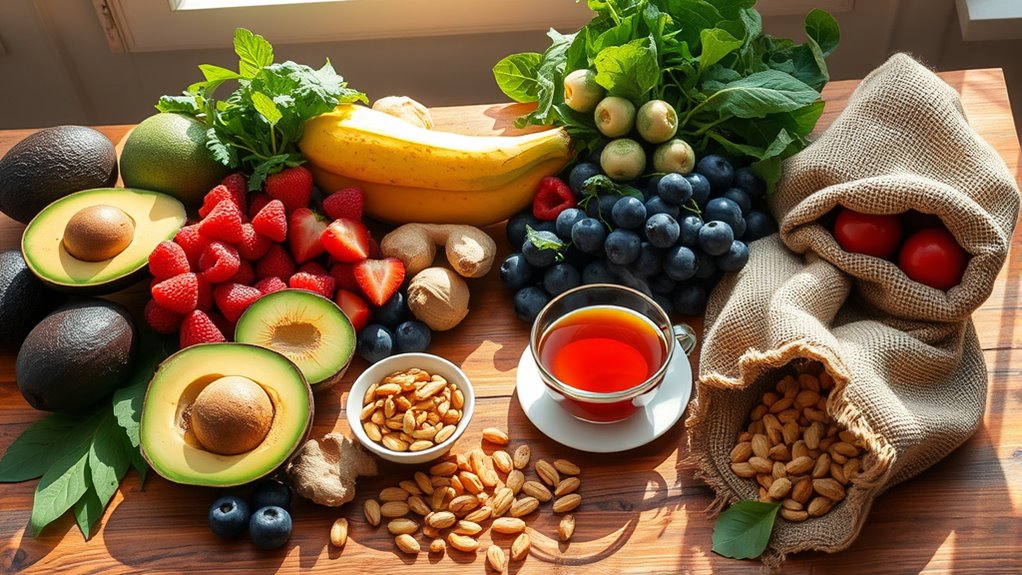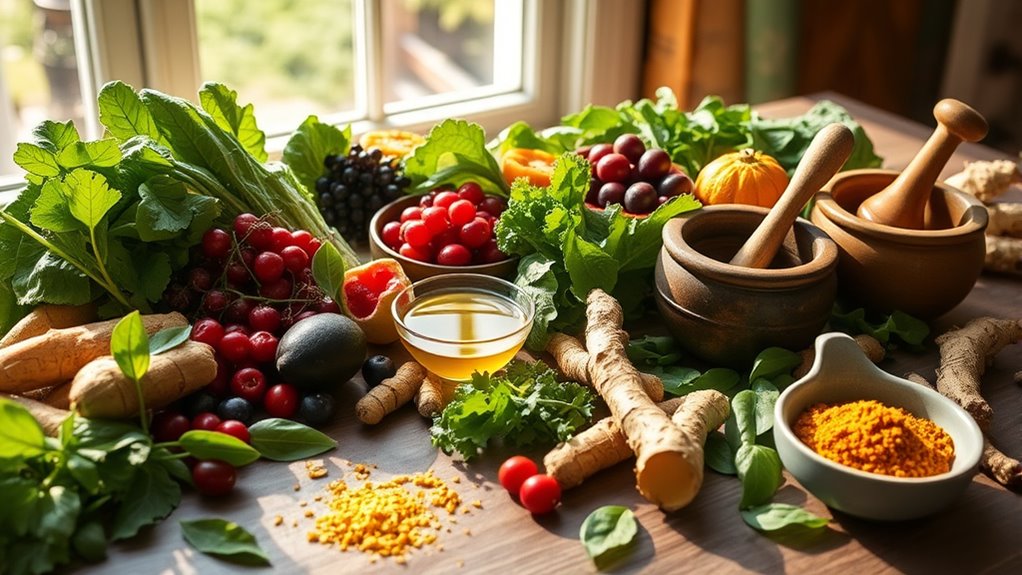To reduce chronic inflammation naturally, adopt an anti-inflammatory lifestyle. Focus on whole, nutrient-dense foods, like fruits, vegetables, and healthy fats, and incorporate lean proteins into your meals. Embrace regular physical activity, manage stress through practices like yoga, and guarantee you get quality sleep each night. Don’t forget to include anti-inflammatory herbs and spices, such as turmeric and ginger, in your cooking. Discover more tips and tricks to enhance your well-being and vitality.
Key Takeaways
- Adopt a Mediterranean diet rich in fruits, vegetables, whole grains, lean proteins, and healthy fats to combat inflammation effectively.
- Incorporate regular physical activity, such as dancing or swimming, to enhance overall health and reduce inflammation.
- Manage stress through practices like yoga, meditation, or leisurely walks to lower inflammation levels in the body.
- Prioritize quality sleep by aiming for 7-9 hours per night and establishing calming nighttime routines.
- Utilize anti-inflammatory herbs and spices, like turmeric and ginger, to enhance meals and promote long-term health.

When you embrace an anti-inflammatory lifestyle, you’re not just making a choice for your health; you’re actively reducing the risk of chronic diseases and enhancing your overall well-being. One effective approach to achieve this is by adopting the Mediterranean Diet. This diet emphasizes whole, nutrient-dense foods and is rich in fruits, vegetables, whole grains, lean proteins, and healthy fats, particularly olive oil. By incorporating these food choices into your daily meals, you’re fueling your body with antioxidants and anti-inflammatory compounds that combat oxidative stress and inflammation.
You might find that the Mediterranean Diet is not just about what you eat but also how you eat. Sharing meals with family and friends, savoring each bite, and practicing mindful eating can further enhance your experience. This social aspect promotes connection and joy, reducing stress, which is another key component in managing inflammation. When you’re under stress, your body produces cortisol, a hormone that can lead to increased inflammation if it remains elevated over time. Consequently, stress management techniques like yoga, meditation, or even simply taking a walk can be highly beneficial.
Embrace the Mediterranean Diet by savoring meals with loved ones, fostering connection, joy, and reducing stress for better health.
Incorporating regular physical activity into your routine can also aid in reducing inflammation. Exercise helps improve circulation and can boost your mood, which in turn can lower your stress levels. Choose activities you enjoy, whether it’s dancing, biking, or swimming, so it feels less like a chore and more like a fun way to keep your body active. Remember, consistency is key here; making small, sustainable changes will yield the best results over time.
On top of diet and exercise, prioritizing sleep is vital for an anti-inflammatory lifestyle. Aim for 7-9 hours of quality sleep each night. Sleep is when your body repairs itself and regulates inflammatory responses, so don’t underestimate its importance. Establish a calming nighttime routine to help signal to your body that it’s time to wind down.
Lastly, consider incorporating herbs and spices like turmeric and ginger into your meals. These natural ingredients are known for their anti-inflammatory properties and can easily enhance the flavor of your dishes. By making these dietary and lifestyle changes, you’re setting yourself up for a healthier, more vibrant life. Embracing this lifestyle isn’t just about avoiding inflammation; it’s about nurturing your body and mind for long-term health. Additionally, adopting an AI-powered content strategy can help you discover more effective ways to maintain this lifestyle by providing tailored recommendations based on your preferences and needs.
Frequently Asked Questions
Can Stress Management Techniques Help Reduce Chronic Inflammation?
Yes, stress management techniques can help reduce chronic inflammation. By practicing mindfulness meditation, you can lower your stress levels, which often contribute to inflammation. Additionally, incorporating breathing exercises into your routine can further enhance relaxation and improve your body’s response to stress. These practices not only promote mental well-being but also support your physical health, helping you feel more balanced and reducing the risk of inflammation in the long run.
How Does Sleep Quality Impact Inflammation Levels?
Imagine tossing and turning, your mind racing as dawn approaches. Poor sleep quality can markedly raise inflammation markers in your body. When you don’t practice good sleep hygiene—like keeping a consistent bedtime and creating a restful environment—your body can’t recover properly. This leads to increased levels of stress hormones, which in turn heightens inflammation. Prioritize quality sleep, and you might just notice a drop in those pesky inflammation markers over time.
Are There Specific Supplements for Lowering Inflammation?
Yes, there are specific supplements that can help lower inflammation. You might consider dietary supplements like omega-3 fatty acids, curcumin, and ginger extract, which are known for their anti-inflammatory properties. Herbal remedies such as boswellia and turmeric can also be beneficial. Always consult your healthcare provider before starting any new supplement regimen to guarantee it’s appropriate for your needs and won’t interact with other medications you’re taking.
How Can I Identify Food Sensitivities Related to Inflammation?
Identifying food sensitivities is like being a detective in your own kitchen. Start with an elimination diet, removing common allergens like dairy and gluten for a few weeks. Then, gradually reintroduce them one at a time, noting any reactions. You might discover that certain foods trigger inflammation, acting like a hidden culprit. Keep a food diary to track symptoms and patterns, helping you unravel the mystery of your food allergy and sensitivities.
What Role Does Hydration Play in Inflammation Management?
Hydration plays a vital role in inflammation management. When you maintain a proper hydration balance, your body effectively flushes out toxins and reduces swelling. Increasing your water intake helps keep your joints lubricated, promoting better mobility and less discomfort. It’s important to drink enough water throughout the day, especially if you’re physically active. Remember, staying hydrated can substantially impact how your body responds to inflammation and overall wellness.
Conclusion
Embracing an anti-inflammatory lifestyle isn’t just a trend; it’s a delightful journey towards vibrant health. By making a few simple changes—like savoring nutrient-rich foods and staying active—you’re not only nurturing your body but also inviting a sense of well-being into your life. So, why not treat yourself to this vibrant way of living? After all, a little effort can lead to a wonderfully fulfilling life, free from the burdens of chronic inflammation. Enjoy the ride!










